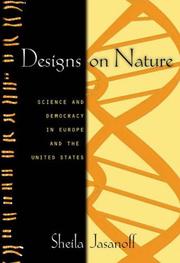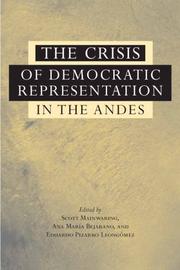| Listing 1 - 8 of 8 |
Sort by
|
Book
ISSN: 12584002 ISBN: 9782707157201 2707157201 Year: 2011 Publisher: Paris : La Découverte,
Abstract | Keywords | Export | Availability | Bookmark
 Loading...
Loading...Choose an application
- Reference Manager
- EndNote
- RefWorks (Direct export to RefWorks)
Quatrième de couverture : "Aujourd'hui, la démocratie participative s'institutionnalise dans la durée, faisant apparaître de nouveaux acteurs, de nouvelles légitimités, de nouveaux objets dans l'implication de "citoyens ordinaires" à la prise de décision publique. Cependant, si l'idée de participation est au moins aussi ancienne que l'histoire des démocraties modernes, l'étude de sa dimension diachronique restait à faire. D'où l'intérêt de cet ouvrage réunissant les contributions des meilleurs spécialistes, qui proposent, dans une perspective comparative, un regard historique organisé en trois temps. La première partie interroge la généalogie des catégories utilisées par les acteurs et par les observateurs. La deuxième met en regard la France et les Etats-Unis, dans une période charnière de réformes progressistes - la fin du XXe et le début du XXe siècle-, qui voit se mettre en place les premiers éléments de l'Etat-providence et s'expérimenter de nouvelles formes de participation. Enfin, la troisième partie retrace les relations qui se nouent entre les sciences ou l'université et le reste de la société, et la façon dont la question de la participation citoyenne a été posée dans ce contexte. Une réflexion sur le temps long débouchant sur des propositions politiques et normatives pour les débats du présent."
Deliberative democracy. --- Deliberative democracy --- Democracy and science --- Démocratie délibérative --- Démocratie et sciences --- History --- Histoire --- Political participation --- Democracy --- Démocratie délibérative --- Démocratie et sciences --- Community Participation --- Deliberative democracy - France --- Deliberative democracy - United States
Book
ISBN: 9780367704001 9780367823436 Year: 2023 Publisher: New York ; London : Routledge, Taylor & Francis Group,
Abstract | Keywords | Export | Availability | Bookmark
 Loading...
Loading...Choose an application
- Reference Manager
- EndNote
- RefWorks (Direct export to RefWorks)
"This book addresses the complex relationship between the values of liberal democracy and the values associated with scientific research. The chapters explore how these values mutually reinforce or conflict with one another, in both historical and contemporary contexts. The contributors utilize various approaches to address this timely subject, including historical studies, philosophical analysis, and sociological case studies. The chapters cover a range of topics including academic freedom and autonomy, public control of science, the relationship between scientific pluralism and deliberative democracy, lay-expert relations in a democracy, and the threat of populism and autocracy to scientific inquiry. Taken together the essays demonstrate how democratic values and the epistemic and non-epistemic values associated with science are interconnected. Science, Freedom, and Democracy will be of interest to scholars and graduate students working in philosophy of science, history of philosophy, sociology of science, political philosophy, and epistemology."
Science --- Science. --- Research. --- Academic freedom. --- Democracy and science. --- Pluralism. --- Sciences et société. --- Sciences --- Recherche --- Liberté de l'enseignement. --- Démocratie et sciences. --- Social aspects. --- Political aspects --- Political aspects. --- Aspect politique. --- Société.
Book
ISBN: 2913911056 9782913911055 Year: 2011 Publisher: [Toulouse] : Librairie Ombres blanches,
Abstract | Keywords | Export | Availability | Bookmark
 Loading...
Loading...Choose an application
- Reference Manager
- EndNote
- RefWorks (Direct export to RefWorks)
Democracy and science --- Research --- Science and state --- Technology and state --- Démocratie et sciences --- Économie du savoir --- Politique scientifique --- Government policy --- Finance. --- Démocratie et sciences --- Économie du savoir

ISBN: 0691118116 0691130426 9780691130422 9786613133373 1400837316 1283133377 9781400837311 Year: 2007 Publisher: Princeton, N.J. Princeton University Press
Abstract | Keywords | Export | Availability | Bookmark
 Loading...
Loading...Choose an application
- Reference Manager
- EndNote
- RefWorks (Direct export to RefWorks)
Biology and politics have converged today across much of the industrialized world. Debates about genetically modified organisms, cloning, stem cells, animal patenting, and new reproductive technologies crowd media headlines and policy agendas. Less noticed, but no less important, are the rifts that have appeared among leading Western nations about the right way to govern innovation in genetics and biotechnology. These significant differences in law and policy, and in ethical analysis, may in a globalizing world act as obstacles to free trade, scientific inquiry, and shared understandings of human dignity. In this magisterial look at some twenty-five years of scientific and social development, Sheila Jasanoff compares the politics and policy of the life sciences in Britain, Germany, the United States, and in the European Union as a whole. She shows how public and private actors in each setting evaluated new manifestations of biotechnology and tried to reassure themselves about their safety. Three main themes emerge. First, core concepts of democratic theory, such as citizenship, deliberation, and accountability, cannot be understood satisfactorily without taking on board the politics of science and technology. Second, in all three countries, policies for the life sciences have been incorporated into "nation-building" projects that seek to reimagine what the nation stands for. Third, political culture influences democratic politics, and it works through the institutionalized ways in which citizens understand and evaluate public knowledge. These three aspects of contemporary politics, Jasanoff argues, help account not only for policy divergences but also for the perceived legitimacy of state actions.
Democracy and science --- Démocratie et sciences --- Démocratie et sciences --- Biotechnology --- Biotechnologie --- Government policy --- Politique gouvernementale --- Science and democracy --- Science --- Industrial and intellectual property --- General ethics --- Political sociology --- European Union --- United States --- United States of America --- Science et éthique --- FINANCEMENT DE LA SCIENCE --- politique publique --- Europe --- Etats-Unis --- aspects moraux et éthiques --- politique gouvernementale
Book
ISSN: 12425087 ISBN: 9782130569909 2130569900 Year: 2010 Publisher: Paris : Presses universitaires de France,
Abstract | Keywords | Export | Availability | Bookmark
 Loading...
Loading...Choose an application
- Reference Manager
- EndNote
- RefWorks (Direct export to RefWorks)
En examinant certaines de nos croyances les plus fondamentales sur le rôle de la science dans nos sociétés, Philip Kitcher s'engage dans le débat crucial de savoir quels types de connaissances scientifiques doivent être recherchés, et comment ces connaissances doivent être utilisées. Il existe aujourd'hui une opposition très forte entre les puristes, qui soutiennent que tout accroissement de connaissances est souhaitable et bénéfique pour tous, et ceux pour qui, au contraire, la science sert avant tout les intérêts de groupes dominants. Kitcher rejette ces deux positions et dresse un portrait pragmatique de la science où la recherche de la vérité garde toute sa place, tout en permettant que les choix des questions à traiter soient le résultat d'un consensus social. En prenant notamment pour exemple les programmes de séquençage du génome humain, l'auteur interroge la responsabilité des chercheurs et propose une nouvelle vision de la recherche scientifique intégrant une forme de démocratie délibérative. L'essentiel de l'ouvrage est consacré à défendre cet idéal, qui s'oppose à une conception "théologique" de la science, où l'accroissement de nos connaissances serait une fin en soi. Ses conclusions, à savoir que la recherche scientifique de vérités doit être guidée par des débats démocratiques et que certains programmes de recherche ne doivent pas être poursuivis, ne manqueront pas de soulever la controverse
Philosophy and science --- Comprehension (Theory of knowledge). --- Democracy and science --- Philosophie et sciences --- Compréhension (Théorie de la connaissance) --- Démocratie et sciences --- Sciences --- Philosophie des sciences --- Théorie de la connaissance --- Aspect social --- Compréhension (Théorie de la connaissance) --- Démocratie et sciences --- Philosophie des sciences. --- Théorie de la connaissance. --- Démocratie et sciences. --- Aspect social.

ISBN: 0804767912 1429456809 9781429456807 0804752788 9780804752787 9780804767910 Year: 2006 Publisher: Stanford, Calif. Stanford University Press
Abstract | Keywords | Export | Availability | Bookmark
 Loading...
Loading...Choose an application
- Reference Manager
- EndNote
- RefWorks (Direct export to RefWorks)
This volume analyses and explains the crisis of democratic representation in five Andean countries: Bolivia, Colombia Ecuador, Peru and Venezuela. It addresses an important question for Latin America as well as other parts of the world: why does representation sometimes fail to work?
Representative government and representation --- Democracy --- Political culture --- Culture --- Political science --- Self-government --- Equality --- Republics --- Parliamentary government --- Political representation --- Representation --- Constitutional history --- Constitutional law --- Elections --- Suffrage --- Andes Region --- Acuerdo de Cartagena countries --- Andean countries --- Andean region --- Politics and government. --- Democracy and science --- Gouvernement représentatif --- Démocratie et sciences --- Culture politique --- Andes --- Politique et gouvernement
Book
ISBN: 9781596916104 1596916109 9781408824832 9781408824665 1408824833 Year: 2010 Publisher: New York, N.Y. Bloomsbury
Abstract | Keywords | Export | Availability | Bookmark
 Loading...
Loading...Choose an application
- Reference Manager
- EndNote
- RefWorks (Direct export to RefWorks)
The U.S. scientific community has long led the world in research on public health, environmental science, and other issues affecting the quality of life. Our scientists have produced landmark studies on the dangers of DDT, tobacco smoke, acid rain, and global warming. But at the same time, a small yet potent subset of this community leads the world in vehement denial of these dangers. In their new book, *Merchants of Doubt*, historians Naomi Oreskes and Erik Conway explain how a looseknit group of high-level scientists, with extensive political connections, ran effective campaigns to mislead the public and deny well-established scientific knowledge over four decades. In seven compelling chapters addressing tobacco, acid rain, the ozone hole, global warming, and DDT, Oreskes and Conway roll back the rug on this dark corner of the American scientific community, showing how the ideology of free market fundamentalism, aided by a too-compliant media, has skewed public understanding of some of the most pressing issues of our era.
Environmental protection. Environmental technology --- milieu --- Scientists --- Democracy and science --- Scientifiques --- Démocratie et sciences --- Professional ethics --- Déontologie --- Science news --- Moral and ethical aspects --- #SBIB:35H411 --- #SBIB:316.23H2 --- Democracy and science. --- Science and democracy --- Science --- News, Science --- Popularization of science --- Communication in science --- Journalism --- Technical writing --- Beleidscyclus: voorbereiding (inclusief planning) --- Sociologie van de wetenschappen --- Professional ethics. --- Moral and ethical aspects. --- Popularization --- Démocratie et sciences --- Déontologie --- klimaat --- climat --- Scientists - Professional ethics --- Science news - Moral and ethical aspects
Book
ISBN: 9780262013246 026201324X 9780262513043 0262513048 9780262258647 0262258641 9780262258050 0262258056 1282694340 9781282694347 9786612694349 Year: 2009 Publisher: Cambridge : MIT Press,
Abstract | Keywords | Export | Availability | Bookmark
 Loading...
Loading...Choose an application
- Reference Manager
- EndNote
- RefWorks (Direct export to RefWorks)
Mark Brown draws on canonical & contemporary political & scientific theory, from Machiavelli to Latour, to throw light on how scientific expertise may be brought into a representative democracy.
Démocratie et sciences --- Sciences --- Représentation politique --- Science --- Science and state. --- Science and state --- Representative government and representation. --- Democracy. --- Aspect politique --- Political aspects. --- Citizen participation. --- Démocratie et sciences. --- Représentation politique. --- Aspect politique. --- Self-government --- Political science --- Equality --- Representative government and representation --- Republics --- Parliamentary government --- Political representation --- Representation --- Constitutional history --- Constitutional law --- Democracy --- Elections --- Suffrage --- Science policy --- State and science --- State, The --- Natural science --- Natural sciences --- Science of science --- Government policy --- SOCIAL SCIENCES/Political Science/General --- SCIENCE, TECHNOLOGY & SOCIETY/General --- Démocratie et sciences. --- Représentation politique.
| Listing 1 - 8 of 8 |
Sort by
|

 Search
Search Feedback
Feedback About UniCat
About UniCat  Help
Help News
News